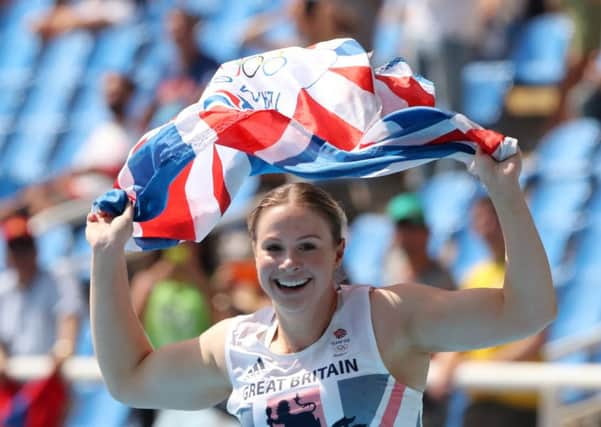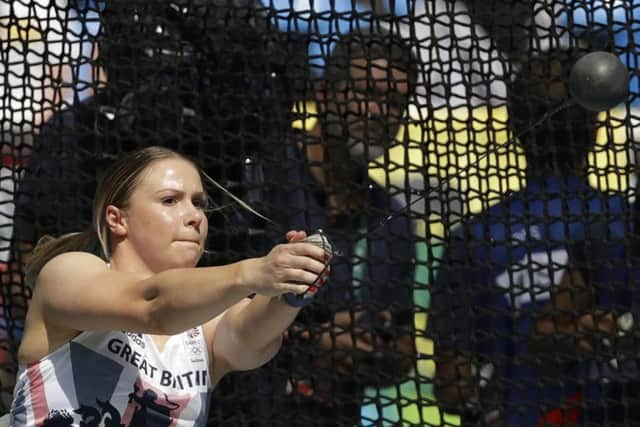Rio 2016: Former ballet dancer Sophie Hitchon wins Olympic hammer medal


The former ballet dancer launched the hammer out to 74.54 metres to move from sixth place to third and become the first British woman to win an Olympic medal in the discipline.
Indeed she is the first Briton at all to win an Olympic hammer medal since 1924.
Advertisement
Hide AdAdvertisement
Hide AdThe 25-year-old from Burnley only squeezed into the final as the 11th of 12 qualifiers.


She lay in third place in the early stages of the competition thanks to a second-round throw of 73.29m, but was bumped down the standings and looked set to miss out on the podium.
But on her sixth attempt she produced a throw which added a whopping 70 centimetres to her own national record. She completed a lap of honour draped in the Union Flag, the fourth British athletics medal winner of the Games.
“I can believe it a little bit because training’s been going so well, but to do it in competition is a little bit different,” she said.
Advertisement
Hide AdAdvertisement
Hide Ad“I knew it was there if I just pulled it together. To do it in the sixth round was a bit special.


“I knew straight away when I let go. I turned around and my coach (Tore Gustafsson) was like, ‘yeah’. I know if he likes it it’s going far. When it landed I was a bit like, ‘is it, is it?’ I didn’t want to look stupid because I’d been cheering. It came off and I was thrilled.”
Hitchon, whose family were following her progress from back in England, finished fourth at last year’s World Championships in Beijing and the European Championships in Amsterdam last month.
“That was frustrating,” she said. “But to do it in an Olympics trumps that.”
Advertisement
Hide AdAdvertisement
Hide AdHitchon’s was the first Olympic medal in the event for Britain since Malcolm Nokes won bronze in Paris 92 years ago. The women’s event has only been on the Olympic programme since Sydney in 2000.
Poland’s Anita Wlodarczyk took the gold in a world record 82.29m, the third world record at the Olympic Stadium on only the fourth day of competition.
She won by more than five-and-a-half metres, and was almost eight ahead of Hitchon, but the Briton produced a very consistent series apart from a foul in round one and hopes to be able to close the gap.
“Anita’s always winning, but hopefully in a few years we can all be clutching at her heels a little bit,” she said.
Advertisement
Hide AdAdvertisement
Hide AdThe hammer is perhaps the least glamorous event on the athletics programme - it is not included in the Diamond League, the series of major one-day meetings - and on the face of it seems incongruous with a ballet background, but Hitchon disagrees.
“I did ballet from when I was in nursery school to when I was about 10,” she said. “I was never going to be prima ballerina. But I think it’s done a lot for me, it helped me a lot.”
Dina Asher-Smith began her bid for an Olympic medal in the women’s 200m by cruising into the semi-finals.
Asher-Smith, who has gone from box carrier on ‘Super Saturday’ at London 2012 to Great Britain’s best-ever female sprinter, jogged through her heat in 22.77 seconds, to leave plenty in the tank for the tougher challenges to come.
Advertisement
Hide AdAdvertisement
Hide AdShe came home second to Nigeria’s Blessing Okagbare, but had eased off long before the line.
“It was good, I was really happy,” said the 20-year-old, who finished fifth at last year’s World Championships.
“I wanted to get out strong and put myself in a good position and then conserve my energy for the next round and I’ve done that.”
Team-mate Jodie Williams also qualified as a fastest loser.
Nineteen-year-old Ruth Jebet, the Kenyan now competing for Bahrain, ran the second-fastest time in history to claim a dominant victory in the 3,000m steeplechase. She finished in 8:59.75, winning by more than seven seconds.
In the men’s event Rob Mullett failed to qualify for the final, but Sebastian Rodger, Jack Green and Ireland’s Thomas Barr all made it through to the 400m hurdles semi-finals.